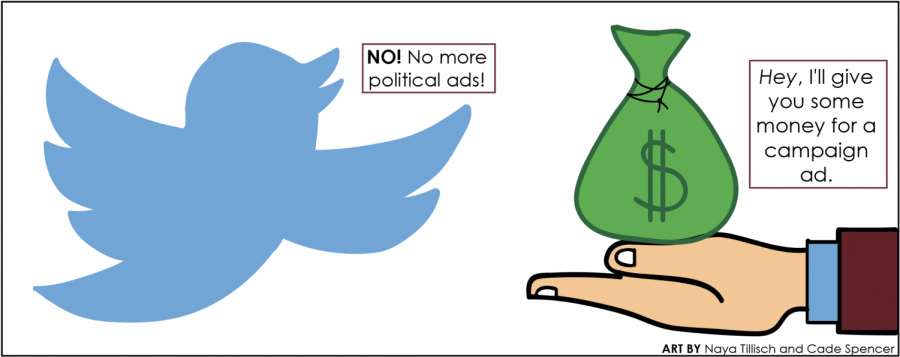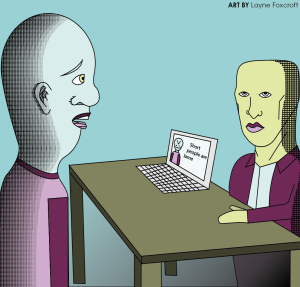Twitter banning political ads sparks a Facebook controversy
Naya Tillisch and Cade Spencer
A Facebook controversy has surfaced in regards to Twitter banning all political ads.
December 21, 2019
Twitter recently got rid of their policy of promoting political ads on their platform. This was a somewhat controversial action for them to do, and has caused some debate. On one hand people are cheering on the decision, and on the other hand people are saying its unfair.
I think that this move from Twitter is a correct one, and that other platforms should start paying attention and follow suite.
Social media companies have recently been getting flack for their presence of foreign bots, and an important moment happened during the 2016 presidential election, when Russia agencies used technology to create large waves of bots to push whatever narratives they wanted in the election. It’s even been largely thought that these groups got their orders from the Russian government, meaning a foreign power was able to influence our elections here in the United States.
Social media sites have long been criticized for “allowing” these things to take place on their platform. For instance when Mark Zuckerberg, the CEO of Facebook, was called in front of congress. He was asked about the fragility of Facebook regarding the presence of bots on the platform, which he pretty much denied and underplayed the issue.
Why is Twitter doing this? This isn’t about free expression. This is about paying for reach. And paying to increase the reach of political speech has significant ramifications that today’s democratic infrastructure may not be prepared to handle.
Well, they may hide behind a banner of goodwill, but many suspect that they are doing this to draw comparisons with one of their main competitors, Facebook who are extremely lax on rules for ads that can be run on their platform, and have got a heavy amount of scrutiny for their lack of security on many fronts of their platforms. Basically this move is a move that is a bunch of free PR for Twitter.
This is a very good thing though, even though Twitter, and its CEO may be removing political ads for the wrong reasons they are at least doing something, which surprisingly is something that I find hard to come by on this issue. It’s funny that while Facebook-owned Instagram is busy removing likes on photos, Twitter is doing something about a serious issue.
Now it should be addressed that this doesn’t affect Twitter too much economically, they brought in only $3 million compared Facebook’s margin of profit its a drop in a bucket, so they really aren’t sacrificing that much by making this move.
Some opposition to this move has been from small political campaigns that use political ads as a tool for organization, which honestly is a valid criticism, and I do think that small local campaigns should be able to get ads, but these aren’t the people that are buying ads, at least at a large scale. Certain individuals test out who has a bigger bank account than their opponents by buying tons and tons of ads.
An example of this can be seen in the current democratic race with candidate Tom Steyer, who has spent $20 million on TV and radio ads already, shooting his competition out of the water by more than $10 million and that’s his second closest competitor.
Steyer has been spending so much in order to keep himself in the race, not even at the forefront, it really isn’t fair. It begs the question that pretty much anyone no matter how qualified they are can compete in elections if they spend enough money.










